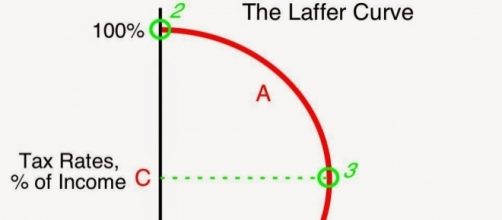The Laffer Curve is named after the man who figured out what Jesus had in mind when he told of giving talents (money) to folk to invest. The ones with the most did fine but the one with the least hoarded. In our society, things are reversed. The one percent and the banks hoard. The rest spend just to get by.
There is someone else knocking at the door today. He is a con artist now president named Donald trump. He offers is a simple trigger to grow the economy. His critics say he will merely grow huge deficit and debt. He wants a 15 percent tax on businesses across the board.
That will free up money for sure. CNBC says maybe a 20 percent bump in the S&P.
Laffer's not the problem, we are
But there's a problem. Money to invest is one thing. The problem is us. We do not agree where we want to go. We do not agree on what to invest in. We have only one avenue to an agreement. It starts with saying what we have is not sustainable. Things cannot continue as they are. The thing that has to change is us. On that, there is no consensus at all.
Enter cybercommunities
Cybercommunities offer a clear and useful means of thinking cogently about the future, which is what investment is meant to be about. Our president and the people around him seem focused on keeping the same economy, the one we have now, operating into the future.
Cybercommunities says there are several reasons why this thinking is very wrong. Let's start with us.
Religions are dying but they are right on one thing
Religions are dying because they cannot achieve universal reach with their creeds and their claims. But they all see us as the problem. If we are not free to change, if there is no reason to change, then we can and should accept that there is no need for religion anymore. What we need to function is lodged within us, waiting to be tapped. Spirituality yes, religion no.
We solve our problem by looking within, discovering conscience and giving up the sort of thinking that has been common forever. That is binary thinking. We are meant to be triadic.
We are meant to think with two weapons that supplement our sense of reality. The first is ethics. The second is aesthetics, how we express and act. We need all three working as a unity to live decently. Reality, ethics, aesthetics, a triad.
In addition to going triadic, we need to move forward
The argument of cybercommunities is that we will only solve our current global race to save ourselves from the effects of climate change by phasing out the automobile and ending our dependence on oil. This is precisely the basis of the economy Mr., Trump wants us to honor and bow down to. We can't and we won't.
We propose more, not less prosperity
We propose an economy driven by the modular, lego-like elements of the actual construction of cybercommunities worldwide.
These are the components of spaces, all spaces, what we call walls and ceilings and floors, all units of a future where we will be able to assemble things as we wish. The cost of such smart apps, if we can surmise a bit, is vastly more than what we spend on oil and cars and the market is universal.
We move toward basic income
Universal basic income is the logical step we must take to a world where automation makes conventional work less and less necessary and where future work is both a privilege and a choice. This income will be a floor that makes the achievement of benchmarks toward greater prosperity a universal desire.
We move toward nonviolence and disarmament
The move to triadic thinking enables a move toward universal nonviolence and therefore to universal disarmament.
Without linking individual change to this massive political and economic change we are whistling in the wind. But do not underestimate the power of a global movement toward the values that underlie cybercommunities.
Ethics is universal values
The universal values of cybercommunities, the things we subscribe to, are tolerance, helpfulness, and democracy. Tolerance is seen as strength and flexibility. Helpfulness is regarded as enablement and education. Democracy is understood to be rights, the same rights for all. Democracy is also the basis for creating within each cybercommunity a constitutional polity based on triadic principles.
Where did evil go?
There are two iterations of evil. The first is evoked by the powerful to explain reality and foreclose the possibility of any change because the world is a cesspool doomed to hell and the most powerful deserve to be at the helm.
This is false and underlies the basic sin of the powerful, hypocrisy, as Jesus well understood. The second iteration sees evil as harm and hurt and measures it more and more closely. It makes education the basis of dealing with it. It does not see us as suddenly perfect, only as capable of becoming better.
The Laffer curve is not evil. Not investing well is.

